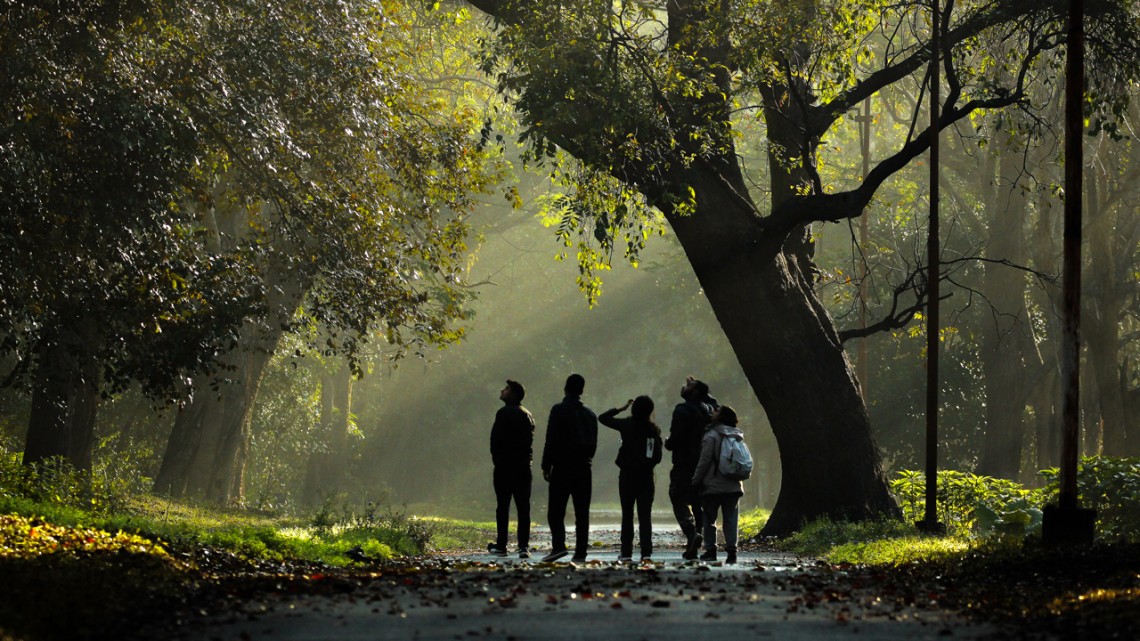
A Cornell Lab of Ornithology study suggests that enjoying nature close to home was associated with the greatest sense of well-being during the pandemic.
Nature near home associated with well-being during COVID
By Pat Leonard
Numerous studies have shown that exposure to nature can improve mental health and well-being. A new study from the Cornell Lab of Ornithology dug a little deeper, looking at what kind of nature experiences were associated with a greater sense of well-being during the COVID pandemic.
The findings, published in the journal People and Nature, suggest that enjoying nature close to home was associated with the greatest sense of well-being, compared to longer, more intense nature excursions, or nature experienced secondhand through various media.
“I think the thing that really calls to me from this work is the importance of just being able to have a bit of nature that’s close by and that you can access even for a short time,” said lead author Tina Phillips, assistant director of the Center for Engagement in Science and Nature at the Cornell Lab.
The authors surveyed more than 3,200 U.S. residents in October 2020, six months into the pandemic, when many lockdowns were still in place. They asked people to rate their levels of loneliness, repetitive negative thoughts, mental well-being and how emotionally affected they were by the pandemic.
The answers given were analyzed along with the frequency with which respondents participated in three types of nature engagement during the pandemic:
- Nearby nature: activities close to home, such as gardening, taking a walk, watching nature through a window and birdwatching;
- Nature media: indirect exposure through reading, nature documentaries and wildlife cameras; and
- Nature excursions: more intense experiences requiring planning and travel, such as fishing trips, hunting, backpacking and kayaking.
The authors said that this type of research does not establish a cause-and-effect relationship among the study variables, only that both often occur together. It's not necessarily the case that one variable predicts another.
They also hypothesized, based on existing literature, that any type of nature exposure should be associated with higher levels of reported well-being, but that wasn’t necessarily the case.
“The biggest surprise was that [longer] nature excursions were not correlated with better well-being,” Phillips said. “Loneliness was worse for people who did more of those activities, the emotional impact of the pandemic was worse, and reported mental health was worse.”
Co-author Nancy Wells, a professor in the College of Human Ecology, said the survey also highlighted ongoing social justice issues around access to nature.
“The pandemic laid bare a host of societal inequities,” Wells said. “It is often those with the greatest need who have the least access to nearby nature. Everyone should be able to access the natural environment within a short distance from home. We can make this a reality by protecting natural lands, creating parks and implementing policies and programs to ensure access for all.”
Co-authors included doctoral student Abigail Brown and Jordan Tralins ’23, who helped conduct the study funded by a grant from Cornell’s Atkinson Center for Sustainability. Both found it to be an eye-opening experience, even as they had to cope with the pandemic themselves.
“I have always been drawn to the intersections between humans, the environment and health,” said Tralins, who is heading to medical school next year. “This type of research is important because it sheds light on the value and benefits of nature with clear, tangible data.”
“I’m investigating the role of nature in helping young people cope with climate change,” Brown said. “This research gave me a lot of hope and a purpose at a time when coming back to school for senior year and working on grad school applications in the middle of the pandemic was overwhelming.”
Reaping mental and emotional benefits from nature doesn’t have to take a lot of time, the authors said.
“We can’t emphasize enough the power of spending even 10 minutes outside,” Phillips said. “There’s so much evidence that taking the time to be outside in whatever slice of nature is nearby can be so beneficial.”
Pat Leonard is a writer for the Cornell Lab of Ornithology.
Media Contact
Adam Allington
Get Cornell news delivered right to your inbox.
Subscribe
